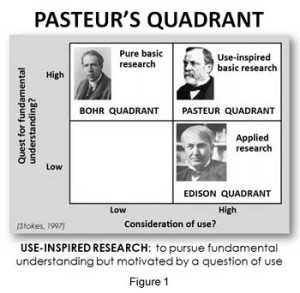Last month, I had the great privilege of attending the 100th Ecological Society of America meeting. This meant there were many opportunities to reflect upon the last century of ecological science and think about what worked, what didn’t, and where we go from here. As with many of the sciences, this involved a lot of hypothesizing about what a future successful scientific career will look like. Almost unanimously agreed upon was the fact that the rigid and one-track paths of the past are crumbling around us as we speak. Ecology also has much to teach the world, in an age of trying to deal with global issues of climate change, food security, and ecosystem service conservation.
In one of these sessions, a number of the speakers pointed to a book written about 1990’s scientific practice by Donald Stokes called Pasteur’s Quadrant. While an old reference now, the speakers encouraged us that we haven’t truly taken the message to heart yet, and that the type of inward gaze on scientific culture is exactly what we need today. In short, Stokes classified scientists into four types, depending on whether their mission was to advance understanding of the universe, help solve real-life issues, both, or neither. He then aligned some well-known scientists with each category.
In the ecological world and the talks at ESA, the lower right quadrant was occupied by natural historians – people with deep local knowledge but without much practical use. Each person who presented the quadrants included a different natural historian, which made the general point: no one remembers people who work in this quadrant, but that doesn’t mean that they’re not important or that folks in other quadrants don’t rely on their work regularly.
More generally, the conversation of who goes where brings up an overlay of professional rewards. People who win Nobel prizes, or MacArthur awards in ecology, almost all fit in the Bohr quadrant. People remembered popularly by members of the public over centuries almost all fit in the Edison quadrant. However, potentially the most impactful (if unappreciated) work falls within Pasteur’s quadrant, where it can meet the needs of both scientific and public audiences. Stokes went on to say that more people should be trained and rewarded for use-inspired research.
In the coming century of ecology, and all science, we are tasked with advancing our knowledge of the universe while also contributing to some very large global issues. Pasteur and others like him are living proof that achieving both goals simultaneously is possible. Not everyone can be Pasteur, as we rely on workers in all four quadrants to put together a complete scientific profile. But we could help out future generations by redefining one kind of success as use-inspired theory building. By cutting down the basic/applied divide and admitting that doing applied work does not make you a lesser scientist. And remember to give credit to your natural historians.